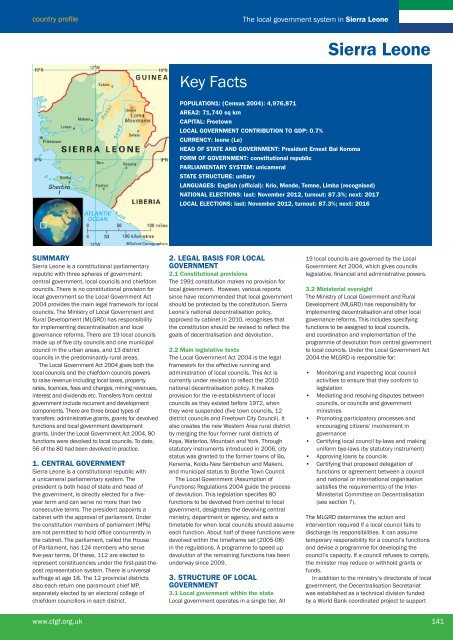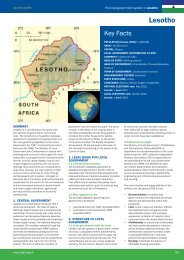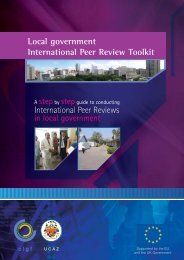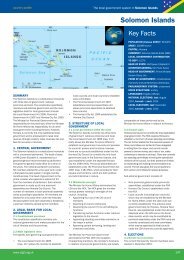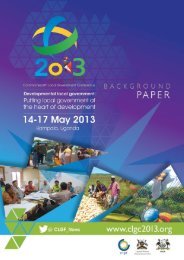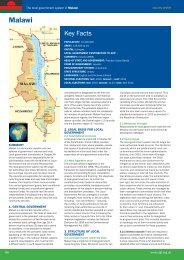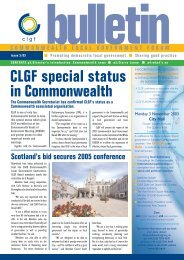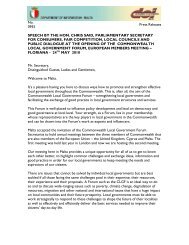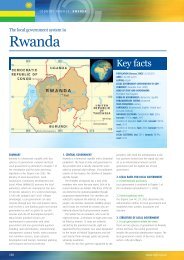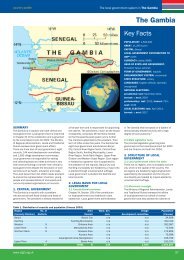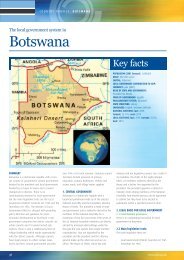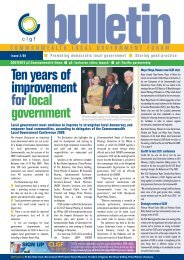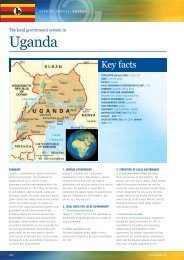Download full profile of Sierra Leone
Download full profile of Sierra Leone
Download full profile of Sierra Leone
You also want an ePaper? Increase the reach of your titles
YUMPU automatically turns print PDFs into web optimized ePapers that Google loves.
country <strong>pr<strong>of</strong>ile</strong><br />
The local government system in <strong>Sierra</strong> <strong>Leone</strong><br />
<strong>Sierra</strong> <strong>Leone</strong><br />
Key Facts<br />
POPULATION1: (Census 2004): 4,976,871<br />
AREA2: 71,740 sq km<br />
CAPITAL: Freetown<br />
LOCAL GOVERNMENT CONTRIBUTION TO GDP: 0.7%<br />
CURRENCY: leone (Le)<br />
HEAD OF STATE AND GOVERNMENT: President Ernest Bai Koroma<br />
FORM OF GOVERNMENT: constitutional republic<br />
PARLIAMENTARY SYSTEM: unicameral<br />
STATE STRUCTURE: unitary<br />
LANGUAGES: English (<strong>of</strong>ficial): Krio, Mende, Temne, Limba (recognised)<br />
NATIONAL ELECTIONS: last: November 2012, turnout: 87.3%; next: 2017<br />
LOCAL ELECTIONS: last: November 2012, turnout: 87.3%; next: 2016<br />
SUMMARY<br />
<strong>Sierra</strong> <strong>Leone</strong> is a constitutional parliamentary<br />
republic with three spheres <strong>of</strong> government:<br />
central government, local councils and chiefdom<br />
councils. There is no constitutional provision for<br />
local government so the Local Government Act<br />
2004 provides the main legal framework for local<br />
councils. The Ministry <strong>of</strong> Local Government and<br />
Rural Development (MLGRD) has responsibility<br />
for implementing decentralisation and local<br />
governance reforms. There are 19 local councils<br />
made up <strong>of</strong> five city councils and one municipal<br />
council in the urban areas, and 13 district<br />
councils in the predominantly rural areas.<br />
The Local Government Act 2004 gives both the<br />
local councils and the chiefdom councils powers<br />
to raise revenue including local taxes, property<br />
rates, licences, fees and charges, mining revenues,<br />
interest and dividends etc. Transfers from central<br />
government include recurrent and development<br />
components. There are three broad types <strong>of</strong><br />
transfers: administrative grants, grants for devolved<br />
functions and local government development<br />
grants. Under the Local Government Act 2004, 80<br />
functions were devolved to local councils. To date,<br />
56 <strong>of</strong> the 80 had been devolved in practice.<br />
1. CENTRAL GOVERNMENT<br />
<strong>Sierra</strong> <strong>Leone</strong> is a constitutional republic with<br />
a unicameral parliamentary system. The<br />
president is both head <strong>of</strong> state and head <strong>of</strong><br />
the government, is directly elected for a fiveyear<br />
term and can serve no more than two<br />
consecutive terms. The president appoints a<br />
cabinet with the approval <strong>of</strong> parliament. Under<br />
the constitution members <strong>of</strong> parliament (MPs)<br />
are not permitted to hold <strong>of</strong>fice concurrently in<br />
the cabinet. The parliament, called the House<br />
<strong>of</strong> Parliament, has 124 members who serve<br />
five-year terms. Of these, 112 are elected to<br />
represent constituencies under the first-past-thepost<br />
representation system. There is universal<br />
suffrage at age 18. The 12 provincial districts<br />
also each return one paramount chief MP,<br />
separately elected by an electoral college <strong>of</strong><br />
chiefdom councillors in each district.<br />
2. LEGAL BASIS FOR LOCAL<br />
GOVERNMENT<br />
2.1 Constitutional provisions<br />
The 1991 constitution makes no provision for<br />
local government. However, various reports<br />
since have recommended that local government<br />
should be protected by the constitution. <strong>Sierra</strong><br />
<strong>Leone</strong>’s national decentralisation policy,<br />
approved by cabinet in 2010, recognises that<br />
the constitution should be revised to reflect the<br />
goals <strong>of</strong> decentralisation and devolution.<br />
2.2 Main legislative texts<br />
The Local Government Act 2004 is the legal<br />
framework for the effective running and<br />
administration <strong>of</strong> local councils. This Act is<br />
currently under revision to reflect the 2010<br />
national decentralisation policy. It makes<br />
provision for the re-establishment <strong>of</strong> local<br />
councils as they existed before 1972, when<br />
they were suspended (five town councils, 12<br />
district councils and Freetown City Council). It<br />
also creates the new Western Area rural district<br />
by merging the four former rural districts <strong>of</strong><br />
Koya, Waterloo, Mountain and York. Through<br />
statutory instruments introduced in 2006, city<br />
status was granted to the former towns <strong>of</strong> Bo,<br />
Kenema, Koidu-New Sembehun and Makeni,<br />
and municipal status to Bonthe Town Council.<br />
The Local Government (Assumption <strong>of</strong><br />
Functions) Regulations 2004 guide the process<br />
<strong>of</strong> devolution. This legislation specifies 80<br />
functions to be devolved from central to local<br />
government, designates the devolving central<br />
ministry, department or agency, and sets a<br />
timetable for when local councils should assume<br />
each function. About half <strong>of</strong> these functions were<br />
devolved within the timeframe set (2005-08)<br />
in the regulations. A programme to speed up<br />
devolution <strong>of</strong> the remaining functions has been<br />
underway since 2009.<br />
3. STRUCTURE OF LOCAL<br />
GOVERNMENT<br />
3.1 Local government within the state<br />
Local government operates in a single tier. All<br />
19 local councils are governed by the Local<br />
Government Act 2004, which gives councils<br />
legislative, financial and administrative powers.<br />
3.2 Ministerial oversight<br />
The Ministry <strong>of</strong> Local Government and Rural<br />
Development (MLGRD) has responsibility for<br />
implementing decentralisation and other local<br />
governance reforms. This includes specifying<br />
functions to be assigned to local councils,<br />
and coordination and implementation <strong>of</strong> the<br />
programme <strong>of</strong> devolution from central government<br />
to local councils. Under the Local Government Act<br />
2004 the MLGRD is responsible for:<br />
• Monitoring and inspecting local council<br />
activities to ensure that they conform to<br />
legislation<br />
• Mediating and resolving disputes between<br />
councils, or councils and government<br />
ministries<br />
• Promoting participatory processes and<br />
encouraging citizens’ involvement in<br />
governance<br />
• Certifying local council by-laws and making<br />
uniform bye-laws (by statutory instrument)<br />
• Approving loans by councils<br />
• Certifying that proposed delegation <strong>of</strong><br />
functions or agreement between a council<br />
and national or international organisation<br />
satisfies the requirement(s) <strong>of</strong> the Inter-<br />
Ministerial Committee on Decentralisation<br />
(see section 7).<br />
The MLGRD determines the action and<br />
intervention required if a local council fails to<br />
discharge its responsibilities. It can assume<br />
temporary responsibility for a council’s functions<br />
and devise a programme for developing the<br />
council’s capacity. If a council refuses to comply,<br />
the minister may reduce or withhold grants or<br />
funds.<br />
In addition to the ministry’s directorate <strong>of</strong> local<br />
government, the Decentralisation Secretariat<br />
was established as a technical division funded<br />
by a World Bank coordinated project to support<br />
www.clgf.org.uk 141
<strong>Sierra</strong> <strong>Leone</strong><br />
country <strong>pr<strong>of</strong>ile</strong><br />
Table 2. Aggregate revenue and expenditure for local government 2012<br />
Revenue LE (bn) Expenditure LE (bn)<br />
Conditional transfers 74.74 Administrative and operational N/A<br />
Unconditional transfers 14.28<br />
Other transfers 16.91<br />
including DSDP and RCHP*<br />
105.93<br />
Total transfers<br />
Local tax 0.97 Service delivery N/A<br />
Property tax 3.99<br />
Total local tax revenue 4.96<br />
Fees and charges<br />
Market dues<br />
Other fees and charges<br />
Business registration<br />
Licences<br />
Mining royalties 9.49<br />
Other local revenue<br />
Total own revenue 14.45<br />
Total revenue 125.11 Total N/A<br />
*This includes transfers from the DSDP and RCHP Funds. These are also direct transfers to local<br />
governments for the implementation <strong>of</strong> devolved functions across four sectors: health and sanitation,<br />
education, rural water and solid waste management.<br />
implementation and capacity-building for local<br />
government reforms (2006–11). Integration <strong>of</strong><br />
the Secretariat’s functions into the mainstream<br />
<strong>of</strong> the ministry’s work is ongoing and it currently<br />
also provides capacity building and governance<br />
support to a World Bank and EU funded<br />
Decentralised Service Delivery Programme<br />
(2011 to date).<br />
Other government ministries have national<br />
policy-making, technical guidance and<br />
monitoring responsibilities for relevant devolved<br />
functions. The Ministry <strong>of</strong> Finance and Economic<br />
Development (MOFED) issues guidelines for the<br />
preparation <strong>of</strong> development plans.<br />
The president can establish new local councils<br />
as well as, subject to parliamentary approval,<br />
take over the functions <strong>of</strong> any local council for a<br />
period <strong>of</strong> 90 days, or up to 12 months if council<br />
elections are due within the year.<br />
3.3 Council types<br />
There are 19 local councils: five city councils and<br />
one municipal council in the urban areas, and 13<br />
district councils in the predominantly rural areas.<br />
Councils must establish a budgeting and<br />
finance committee, a development planning<br />
committee and a local technical planning<br />
committee to oversee the preparation and<br />
review <strong>of</strong> their local development plan. The<br />
Local Government Act 2004 confers discretion<br />
to establish other committees, which may also<br />
co-opt non-voting members.<br />
3.3.1 Traditional leadership<br />
The paramount chieftaincy is an important<br />
institution in the governance <strong>of</strong> <strong>Sierra</strong> <strong>Leone</strong>.<br />
Under the constitution ‘the institution <strong>of</strong><br />
chieftaincy, as established by customary law<br />
and usage, and its non-abolition by legislation<br />
is guaranteed and preserved’. The MLGRD<br />
has oversight <strong>of</strong> chieftaincy matters including<br />
aspects <strong>of</strong> paramount chieftaincy elections,<br />
chiefdom council and chiefdom police, and<br />
also oversees tribal headmen matters in the<br />
Western Area.<br />
The traditional component <strong>of</strong> local<br />
government administration is comprised <strong>of</strong><br />
chiefdom administrations in the 149 chiefdoms<br />
in the provinces (each headed by a paramount<br />
chief who is elected for life from a ruling family<br />
<strong>of</strong> the chiefdom). In the Western Area, tribal<br />
headmen are appointed by the president to<br />
advise on matters concerning the traditions<br />
<strong>of</strong> their ethnic group, and each village has an<br />
elected village headman.<br />
The basic political unit <strong>of</strong> a chiefdom is the<br />
‘section’, made up <strong>of</strong> a number <strong>of</strong> towns or<br />
villages and headed by a section chief or subchief.<br />
The paramount chief has jurisdiction over<br />
the sections within the chiefdom. The paramount<br />
chief, chiefdom speaker (deputy) and section<br />
chiefs form the political hierarchy, together<br />
with town chiefs and village headmen. The<br />
administration <strong>of</strong> the chiefdom is undertaken<br />
by a chiefdom committee, presided over by the<br />
paramount chief, which serves as an executive<br />
body to the chiefdom council comprising all the<br />
sub-chiefs and chiefdom councillors.<br />
The Chieftaincy Act 2009 makes provision for<br />
the election <strong>of</strong> paramount chiefs and sub-chiefs.<br />
A candidate for paramount chieftaincy must be<br />
from a ruling house that existed at independence<br />
in 1961. In amalgamated chiefdoms (that is<br />
chiefdoms which comprise more than one former<br />
chiefdom amalgamated during the colonial<br />
.period) crowning rotates between the parts <strong>of</strong><br />
the amalgamated chiefdom. Paramount chiefs<br />
are elected by the councillors <strong>of</strong> the chiefdom,<br />
each chiefdom councillor representing every 20<br />
local taxpayers in that chiefdom. The polling is<br />
supervised by the Electoral Commission. The<br />
paramount chief is elected for life, although<br />
s/he may be removed from <strong>of</strong>fice by the<br />
president following a judicial inquiry finding gross<br />
misconduct.<br />
The Chieftaincy Act 2009 specifies the functions<br />
<strong>of</strong> a paramount chief, including:<br />
• Supervising collection <strong>of</strong> local taxes, and<br />
assisting in collection <strong>of</strong> other lawful taxes<br />
• Maintaining order and good government<br />
• Preserving, promoting and, as appropriate,<br />
serving as guardian <strong>of</strong> customs and<br />
traditions<br />
• Serving as an agent <strong>of</strong> development in the<br />
chiefdom<br />
• Supervising the election <strong>of</strong> sub-chiefs in the<br />
chiefdom.<br />
Traditional leaders have a number <strong>of</strong> formal<br />
inputs into governance matters. At the<br />
national level, one paramount chief from each<br />
district serves as an MP. A national council <strong>of</strong><br />
paramount chiefs (NCPC) was established in<br />
October 2003. Each district and city council in<br />
the three provinces includes paramount chief<br />
councillors selected by the paramount chiefs<br />
<strong>of</strong> the district. Paramount chiefs are members<br />
<strong>of</strong> the local council’s ward committee/s within<br />
their chiefdom.<br />
The Local Government Act 2004 requires<br />
chiefdom councils to cooperate with local<br />
councils in the performance <strong>of</strong> the local council’s<br />
functions. The chiefdom councils continue to<br />
perform their traditional functions <strong>of</strong> preventing<br />
the commission <strong>of</strong> <strong>of</strong>fences in their area,<br />
prohibiting or restricting illegal gambling, making<br />
and enforcing by-laws and holding land in trust<br />
for the people <strong>of</strong> the chiefdom. A local council<br />
may delegate any <strong>of</strong> its functions to a chiefdom<br />
council. A council may also consult a traditional<br />
authority where a local custom or tradition<br />
impedes development <strong>of</strong> the area or obstructs<br />
the council in carrying out its responsibilities.<br />
Where the situation is resolved, the council,<br />
through by-laws, can amend the custom or<br />
tradition. Either party can appeal to MLGRD<br />
where there is no resolution.<br />
There is no paramount chieftaincy system in<br />
the Western Area. A total <strong>of</strong> 17 tribal headmen<br />
are appointed by the president, with a mandate<br />
to advise central government on matters relating<br />
to the traditions <strong>of</strong> their ethnic groups within the<br />
Western Area and to communicate government<br />
messages to the people. Village headmen are<br />
elected by universal adult suffrage in the villages<br />
<strong>of</strong> the Western Area rural district to serve a<br />
three-year term.<br />
A national chiefdom governance and<br />
traditional administration policy was adopted by<br />
cabinet in November 2011. The policy reaffirms<br />
the importance <strong>of</strong> the institutions <strong>of</strong> chieftaincy<br />
and traditional administration; it aims to<br />
strengthen these institutions and their alignment<br />
with the decentralisation framework, introducing<br />
modern principles and systems <strong>of</strong> governance<br />
to institutions that are based on custom and<br />
traditional practices. The policy aims to ensure<br />
that chiefdoms are well governed, peaceful and<br />
viable, and have a strong relationship with local<br />
councils so as to improve the effectiveness <strong>of</strong><br />
the local councils as the principal organs for<br />
142<br />
www.clgf.org.uk
country <strong>pr<strong>of</strong>ile</strong><br />
<strong>Sierra</strong> <strong>Leone</strong><br />
development and local service delivery.<br />
Implementation is underway, with a review<br />
<strong>of</strong> existing legal instruments (many <strong>of</strong> which<br />
are obsolete) and proposals for a new legal<br />
framework are being developed for enactment<br />
in 2013-14. Programmes for capacity-building,<br />
including training to modernise administration,<br />
improve governance and develop service<br />
standards in traditional dispute resolution, have<br />
been introduced.<br />
4. ELECTIONS<br />
4.1 Recent local elections<br />
The last local elections took place in November<br />
2012 at the same time as the presidential<br />
and parliamentary elections, with a turnout <strong>of</strong><br />
87.3%. Voter registration, civic education and<br />
the elections themselves are overseen by the<br />
National Electoral Commission.<br />
4.2 Voting system<br />
Local council elections are conducted under the<br />
first-past-the-post system. Mayors/chairpersons<br />
are elected by universal adult suffrage <strong>of</strong> all<br />
registered voters over 18 years old across the<br />
whole local council area, and councillors are<br />
elected on a ward basis. City councils have multimember<br />
wards, with political parties able to field<br />
multiple candidates for each ward.<br />
4.3 Elected representatives<br />
Wards return councillors on a single-member-perward<br />
basis in the 13 district councils (which have<br />
between 18 and 34 wards) and in Freetown City<br />
Council (which has 49 wards). The other city and<br />
municipal councils have multi-member wards.<br />
Paramount chiefs may not stand for <strong>of</strong>fice as<br />
elected councillors. In local council areas where<br />
there is a paramount chieftaincy system (the three<br />
provinces), the paramount chiefs in the council’s<br />
area select between one and three <strong>of</strong> their<br />
number to represent their interests on the local<br />
council. The term <strong>of</strong> <strong>of</strong>fice for elected councillors<br />
and paramount chief councillors is four years.<br />
The political head <strong>of</strong> a local council is the mayor<br />
(city council) or chairperson (district council). The<br />
2008 local government elections introduced direct<br />
election for mayors and chairpersons. Mayors and<br />
chairpersons are also elected for a four-year term<br />
and are eligible for re-election once. The deputy<br />
mayor or chairperson is elected by the councillors<br />
from among their number.<br />
4.4 Women’s representation<br />
In the 2012 local government elections women<br />
accounted for 19.1% <strong>of</strong> all elected councillors (87<br />
out <strong>of</strong> 456), and 11.8% <strong>of</strong> nominated (paramount)<br />
chief councillors (four out <strong>of</strong> 34). Two <strong>of</strong> the 19<br />
mayors/chairpersons, or 10.5%, are female.<br />
Every ward has a ward committee comprising<br />
the ward councillor, paramount chief and up<br />
to ten members elected by ward residents in<br />
a public meeting, whose main function is to<br />
champion self-help and developmental activities<br />
within the ward. Of the ten members at least five<br />
should be women.<br />
5. SYSTEMS FOR COMMUNITY<br />
INVOLVEMENT<br />
5.1 Legal requirement<br />
The Local Government Act 2004 requires that<br />
residents <strong>of</strong> the locality are consulted before<br />
a council approves or reviews its development<br />
plan. The ward committee (cf Section 96 <strong>of</strong> the<br />
Local Government Act 2004) provides a focal<br />
point for discussion <strong>of</strong> local problems and for<br />
making recommendations to the council to<br />
remedy these; and also for mobilising residents<br />
<strong>of</strong> the ward on self-help and development<br />
projects and educating them on their rights and<br />
obligations in relation to local government.<br />
5.2 Implementation<br />
Transparency and accountability to the public<br />
is enhanced through requirements to publish<br />
council documents, budgets and accounts,<br />
development plans etc; and meetings <strong>of</strong> the<br />
council are open to the public.<br />
Most local councils rotate the location <strong>of</strong> their<br />
monthly council meeting between wards to take<br />
the council closer to the people. The capacity <strong>of</strong><br />
civil society groups to monitor local government<br />
and service delivery is being enhanced<br />
through various initiatives, both to strengthen<br />
accountability between service providers and the<br />
poor and to provide feedback for policy-makers.<br />
This includes: training community monitors<br />
in three districts in 2010 (under the ENCISS<br />
programme); training <strong>of</strong> facilitators to involve<br />
communities in monitoring local service delivery;<br />
disseminating information on councils’ activities<br />
to ward level; and, developing monitoring and<br />
social accountability systems.<br />
5.3 E-government<br />
There is no e-government strategy in place.<br />
Neither the ministry nor the national association<br />
<strong>of</strong> local authorities (see section 6) currently have<br />
websites.<br />
6. ORGANISED LOCAL<br />
GOVERNMENT<br />
The Local Councils Association <strong>of</strong> <strong>Sierra</strong><br />
<strong>Leone</strong> (LoCASL) was formed in July 2004.<br />
LoCASL adopted a new constitution in 2011,<br />
providing for national and regional executive<br />
structures. It has a permanent secretariat to<br />
support its membership and implement its<br />
strategic priorities. All 19 councils are members<br />
<strong>of</strong> LoCASL, each with voting representation<br />
on its general assembly through the mayor/<br />
chairperson, deputy mayor/chairperson and<br />
two councillors – at least one <strong>of</strong> whom must be<br />
female – and the chief administrator.<br />
7. INTERGOVERNMENTAL RELATIONS<br />
Intergovernmental relations are formally<br />
established in the Local Government Act<br />
2004. An Inter-Ministerial Committee on<br />
Decentralisation (the IMC) is the highest<br />
political body nationally and is chaired by the<br />
vice-president <strong>of</strong> <strong>Sierra</strong> <strong>Leone</strong>. Its membership<br />
comprises the minister responsible for local<br />
government, the ministers responsible for<br />
finance and economic development, education,<br />
health and sanitation, works, and agriculture;<br />
and the attorney general. Four mayors or<br />
chairpersons <strong>of</strong> local councils, elected from their<br />
number, represent the local councils. The IMC is<br />
responsible for overseeing the implementation <strong>of</strong><br />
the Local Government Act 2004, overseeing the<br />
further development and implementation <strong>of</strong> local<br />
government and decentralisation, protecting and<br />
promoting local democracy and participatory<br />
government, and arbitrating between ministries,<br />
departments and agencies <strong>of</strong> government,<br />
provincial administrations and local councils.<br />
In each <strong>of</strong> the three provinces, a provincial<br />
coordination committee (PCC) is responsible<br />
for coordinating the activities <strong>of</strong> local councils<br />
in the province, ensuring that local councils<br />
collaborate in the execution <strong>of</strong> joint programmes<br />
in which they have an interest, and reviewing and<br />
coordinating the provision <strong>of</strong> public services in<br />
the province. The PCC is chaired by the resident<br />
minister for the province and the committee’s<br />
secretary is the provincial secretary. Its<br />
membership comprises the mayors/chairpersons<br />
and chief administrators <strong>of</strong> each local council<br />
in the province. Government ministries and<br />
departments are required to consult local<br />
councils about any projects affecting their areas.<br />
Local councils may establish joint committees<br />
with power to co-opt for matters in which they<br />
have a common interest. Other agencies (eg<br />
NGOs) working in an area should coordinate their<br />
activities with the local council and operate in<br />
line with the local development plan.<br />
In 2011 the government reinstated the<br />
position <strong>of</strong> district <strong>of</strong>ficer as the ministry’s<br />
principal representative in each district <strong>of</strong> the<br />
three regions (excluding the Western area), to<br />
enhance the ministry’s role – in particular the<br />
interface with traditional authorities (chiefdom<br />
councils) and co-ordination <strong>of</strong> non-devolved<br />
functions <strong>of</strong> other ministries at district level.<br />
Parliament approves the budgets <strong>of</strong> local<br />
councils and <strong>of</strong> MLGRD each year, and receives<br />
the auditor general’s audit report for each local<br />
council. A parliamentary committee on local<br />
government monitors policy and implementation<br />
by the ministry and local councils.<br />
8. MONITORING SYSTEMS<br />
Statutory responsibility for inspecting and<br />
monitoring the 19 local councils rests with the<br />
MLGRD. The ministry does this by investigating<br />
matters that give rise to concern over a council’s<br />
performance, regular monitoring visits and<br />
coordination <strong>of</strong> monitoring. A comprehensive<br />
local government performance assessment<br />
system (known as CLoGPAS) was designed in<br />
2006 to serve as a sustainable mechanism<br />
for monitoring compliance and performance<br />
accountability for councils, devolving MDAs and<br />
civil society. The CLoGPAS results determine<br />
high-performing and low-performing councils,<br />
and guide the provision <strong>of</strong> capacity-building<br />
support to local councils. In its first year (2006)<br />
CLoGPAS’ results were used to design a<br />
performance incentive grant system. CLoGPAS<br />
was reviewed in 2010, and is being further<br />
developed, including indicators to reflect MDA<br />
collaboration with local councils with respect to<br />
devolved functions.<br />
The Local Government Service Commission<br />
(LGSC) was established under the Local<br />
Government Act 2004 to provide regulatory,<br />
performance management, support and<br />
supervision in terms <strong>of</strong> human resource<br />
management to local councils. Its membership<br />
is appointed by the president and approved by<br />
parliament.<br />
www.clgf.org.uk 143
<strong>Sierra</strong> <strong>Leone</strong><br />
country <strong>pr<strong>of</strong>ile</strong><br />
A national joint coordinating committee,<br />
co-chaired by deputy ministers <strong>of</strong> MOFED and<br />
MLGRD with membership including key service<br />
MDAs, was set up to coordinate the monitoring<br />
<strong>of</strong> central-government-funded activities and<br />
projects being implemented by local councils.<br />
There is also a parliamentary committee on<br />
local government, which has an oversight role<br />
in holding local councils and the ministry to<br />
account. The committee may conduct studies<br />
and summon the ministry and councils to<br />
answer questions on their stewardship and<br />
policy. Parliament approves the annual budgets<br />
<strong>of</strong> central government and local councils.<br />
The auditor general undertakes an annual<br />
audit <strong>of</strong> each local council’s accounts and<br />
financial statements and reports both to the<br />
councils and to the minister. The audit reports<br />
are public documents. The minister reports<br />
to parliament on actions taken in response to<br />
matters raised in the report.<br />
All councillors and appointed or assigned<br />
staff are subject to the provisions <strong>of</strong> the Anti-<br />
Corruption Act 2008, which also provides for<br />
the continued existence <strong>of</strong> a national anticorruption<br />
commission (ACC) with a mandate for<br />
the prevention, investigation, prosecution and<br />
punishment <strong>of</strong> corruption and corrupt practices.<br />
Councillors and staff are required to declare<br />
their assets to the ACC. The ACC undertakes<br />
training and monitoring <strong>of</strong> councils’ compliance<br />
with the Act, in cooperation with the ministry.<br />
A district budget oversight committee (DBOC)<br />
operates in each district. Its functions include:<br />
• Assisting in the formulation and monitoring<br />
<strong>of</strong> all poverty-related activities<br />
• Serving as a focal point for all discussions<br />
<strong>of</strong> the medium-term framework budget and<br />
public expenditure tracking surveys<br />
• Monitoring the expenditure <strong>of</strong> all government<br />
allocations to councils<br />
• Serving as intermediary between the<br />
government and the people concerning<br />
budgetary allocations for their districts.<br />
The DBOCs report to MOFED every four months<br />
on the progress <strong>of</strong> budget execution in the<br />
districts, with copies <strong>of</strong> their reports sent to the<br />
parliamentary finance committee and the ACC.<br />
9. FINANCE, STAFFING AND<br />
RESOURCES<br />
9.1 Locally raised revenue<br />
The Local Government Act 2004 gives both local<br />
councils and chiefdom councils powers to raise<br />
revenue from sources including local taxes,<br />
property rates, licences, fees and charges,<br />
mining revenue, interest and dividends etc.<br />
The chiefdom councils also have traditional<br />
sources <strong>of</strong> revenue, mainly local taxes and fees<br />
from local markets. The law stipulates that<br />
they share some <strong>of</strong> these revenues. This has<br />
created tensions between the local councils<br />
and the chiefdom councils and has been<br />
identified as a barrier to revenue mobilisation<br />
by local councils. The new decentralisation<br />
policy and the proposed chiefdom governance<br />
and tribal administration policy seek to<br />
minimise conflict.<br />
9.2 Transfers<br />
Transfers to local councils are <strong>of</strong> two kinds:<br />
vertical and horizontal. The vertical transfer<br />
from central government includes recurrent<br />
and development components. The recurrent<br />
component covers non-salary transfers for<br />
devolved functions and the operational<br />
(administrative) running costs <strong>of</strong> councils. The<br />
development component (local government<br />
development grant or LGDG) is used to finance<br />
local council development projects and is<br />
funded by donors and the central government.<br />
The vertical allocation is not based on any<br />
formula; however, the law guarantees that<br />
upon devolution <strong>of</strong> a function, the allocation<br />
for that function is at a minimum equal to the<br />
pre-devolution amount, to ensure that service<br />
provision does not deteriorate as a result <strong>of</strong><br />
devolution. Also, the law stipulates that annual<br />
increments in the global allocation to local<br />
councils should at minimum match the rate <strong>of</strong><br />
increase in the central government’s operational<br />
budget. In the absence <strong>of</strong> a formula to determine<br />
the vertical allocation, ad-hoc methods through<br />
negotiations with the devolving MDAs are used.<br />
It is likely that negotiating the vertical pool with<br />
line ministries will continue until the effective<br />
costs <strong>of</strong> performing the devolved functions are<br />
<strong>full</strong>y established.<br />
The second type <strong>of</strong> transfer is the horizontal<br />
distribution, which consists <strong>of</strong> a range <strong>of</strong><br />
conditional or tied grants, based on varying<br />
formulae or criteria depending on the purpose<br />
<strong>of</strong> the transfer. Having determined the vertical<br />
pool and horizontal allocation, transfers are<br />
processed on a quarterly basis and funds<br />
disbursed directly to the local council. Councils<br />
have separate accounts for each sector<br />
grant. Councils submit monthly financial and<br />
quarterly technical reports to the ministry<br />
responsible for finance, and accessing next<br />
quarter’s grant is contingent upon submission<br />
<strong>of</strong> the above reports.<br />
There are three broad types <strong>of</strong> horizontal<br />
transfer: administrative grants, grants for<br />
devolved functions and LGDGs. The first two are<br />
stipulated in the Local Government Act 2004<br />
and are financed solely by central government.<br />
The LGDG is co-financed by the central<br />
government and its development partners. It<br />
provides funds that allow councils to undertake<br />
development projects to meet priority needs <strong>of</strong><br />
their localities, including non-discretionary funds<br />
meant to support broad national developmental<br />
objectives. All these transfers are conditional or<br />
tied grants, though in the case <strong>of</strong> LGDG the local<br />
council decides on which project to fund in a<br />
given year.<br />
9.3 Local authority staff<br />
Core staff <strong>of</strong> local councils are employed by<br />
the council following a recruitment process led<br />
by the LGSC in conjunction with the council, in<br />
accordance with LGSC guidelines. Councils must<br />
appoint a local council chief administrator, who<br />
is the head <strong>of</strong> the paid service. Other senior<br />
appointments must meet selection criteria<br />
determined by the LGSC. Councils must establish<br />
departments for administration, planning<br />
and development, finance, and internal audit.<br />
They may also establish ‘thematic functional<br />
departments’ after consulting the LGSC.<br />
Salaries for core staff are paid from central<br />
government grants. In respect <strong>of</strong> devolved<br />
functions, staff devolved from the parent MDA<br />
are paid by central government. Councils<br />
may pay for additional staff from their own<br />
source revenue; the city councils in particular<br />
employ staff for additional functions, eg waste<br />
management and policing.<br />
Mayors/chairpersons receive a stipend paid<br />
by central government grant; councillors do not<br />
receive a salary, but receive travel allowances<br />
and sitting fees paid by central government on a<br />
quarterly basis to the councils.<br />
10. DISTRIBUTION OF SERVICE<br />
DELIVERY RESPONSIBILITY<br />
Under the programme <strong>of</strong> devolution,<br />
responsibility for many basic social services has<br />
been transferred to local councils. Out <strong>of</strong> 80<br />
specified services, 56 have been devolved to<br />
date. These include:<br />
• Primary and secondary health (health<br />
service delivery, health promotion,<br />
procurement <strong>of</strong> drugs for both peripheral<br />
health units and district hospitals)<br />
• Primary and junior-secondary education<br />
(including the payment <strong>of</strong> school fee<br />
subsidies, distribution <strong>of</strong> textbooks and<br />
teaching and learning materials)<br />
• Agriculture extension services (crop and animal)<br />
• Environmental healthcare including access to<br />
safe drinking water and food quality and safety<br />
• Rural water supply<br />
• Solid waste management<br />
• Social welfare (including child welfare, gender<br />
and child advocacy, family case work, probation)<br />
• Registration <strong>of</strong> births and deaths<br />
• Civil marriages<br />
• Fire prevention education and non-technical<br />
fire-fighting<br />
• Licensing <strong>of</strong> canoes<br />
• Establishment and management <strong>of</strong> fish ponds<br />
• Provision <strong>of</strong> local public address equipment<br />
• Community development<br />
• Local economic development.<br />
Some city councils have established a<br />
metropolitan police force, particularly to support<br />
collection <strong>of</strong> revenue and compliance with by-laws.<br />
Contracting-out <strong>of</strong> some services is<br />
discretionary and has been used by some<br />
councils, notably in revenue generation and<br />
waste collection/disposal.<br />
References and useful websites<br />
1. Statistics <strong>Sierra</strong> <strong>Leone</strong> www.statistics.sl<br />
Housing and Population Census 2004<br />
www.statistics.sl/2004_pop._&_hou._<br />
census_ analytical_reports/2004_census_<br />
report_on_population_size_age_and_sex_<br />
structure.pdf<br />
2. UN statistics http://unstats.un.org/unsd /<br />
demographic/products/dyb/dyb2008/<br />
Table03.pdf<br />
• IMF statistics www.imf.org/external/data.htm<br />
• UNDP Human Development Report 2010<br />
www.hdr.undp.org<br />
<strong>Sierra</strong> <strong>Leone</strong> national government<br />
www.statehouse.gov.sl<br />
144<br />
www.clgf.org.uk
country <strong>pr<strong>of</strong>ile</strong><br />
<strong>Sierra</strong> <strong>Leone</strong><br />
Annex A. Summary <strong>of</strong> service provision in different spheres <strong>of</strong> government<br />
Service Delivering authority Remarks<br />
GENERAL ADMINISTRATION<br />
Police<br />
Fire Protection<br />
Civil protection<br />
Criminal justice<br />
Civil justice<br />
Civil status register<br />
Statistical <strong>of</strong>fice<br />
Electoral register<br />
EDUCATION<br />
Pre-school<br />
Primary<br />
Secondary<br />
Vocational and technical<br />
Higher education<br />
Adult education<br />
Other<br />
SOCIAL WELFARE<br />
Kindergarten and nursery<br />
Family welfare services<br />
Welfare homes<br />
Social security<br />
PUBLIC HEALTH<br />
Primary care<br />
Hospitals<br />
Health Protection<br />
HOUSING AND TOWN PLANNING<br />
Housing<br />
Town planning<br />
Regional planning<br />
TRANSPORT<br />
Roads<br />
Transport<br />
Urban roads<br />
Urban rail<br />
Ports<br />
Airports<br />
ENVIRONMENT AND PUBLIC SANITATION<br />
Water and sanitation<br />
Refuse collection and disposal<br />
Cemeteries and crematoria<br />
Slaughterhouses<br />
Environmental protection<br />
Consumer protection<br />
CULTURE, LEISURE AND SPORTS<br />
Theatre and concerts<br />
Museums and libraries<br />
Parks and open spaces<br />
Sports and leisure<br />
Religious facilities<br />
Federal Province/ Local<br />
Government Territory Authority<br />
+ basic fire-fighting.<br />
+ probation services only.<br />
local courts are responsible for<br />
maintaining customary law in areas with a paramount<br />
chieftaincy system.<br />
+ education covering the first 9 years <strong>of</strong> schooling.<br />
+ the local authority is responsible upto mid-secondary<br />
schools, JSSII.<br />
+ education on environmental, fire prevention and<br />
public health issues.<br />
+ including drug control & prevention matters.<br />
+ maintanance <strong>of</strong> primary feeder roads and chiefdom<br />
roads and tracks.<br />
+ city & town councils.<br />
UTILITIES<br />
Gas services .<br />
District heating<br />
Water supply<br />
Electricity<br />
ECONOMIC<br />
Agriculture, forests and fisheries<br />
+ enterprise development.<br />
Economic promotion<br />
Trade and industry<br />
+ mining licences & building permits.<br />
Tourism<br />
Other economic services<br />
www.clgf.org.uk 145


